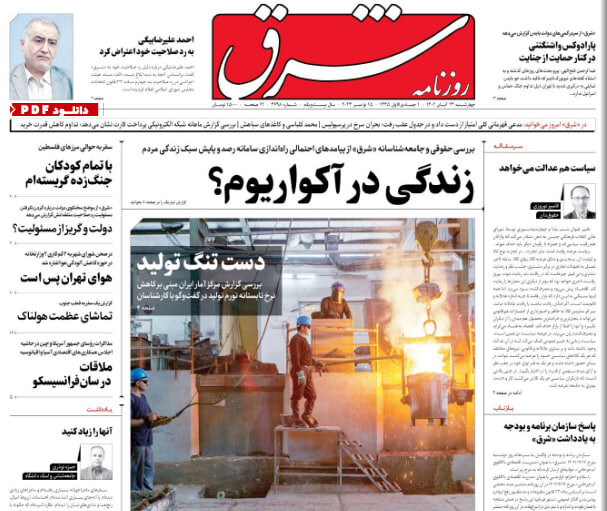Washington's contradictory moves in West Asia

Shargh devoted its headline to the confused state of the Biden administration and wrote: The New York Times previously claimed that the U.S. is not seeking to escalate tensions with Iran and is not planning to enter a war with the country in the face of the current conflict between Israel and Palestinians.
This came after U.S. President Joe Biden released about $6 billion of Tehran’s frozen funds in South Korea as well as five Iranians from US prisons in exchange for five Iranian-Americans jailed in Iran. It has now been revealed that Biden is set to approve a sanctions waiver that will allow Iran to access at least $10 billion in previously frozen funds held in Iraq. The money will allegedly be transferred to banks in Oman and Europe. It seems that since the beginning of the war between Hamas and Israel, the Biden government has been suffering from a behavioral contradiction, on one hand, it is trying to avoid escalating the tension in the region, especially the conflict with Iran, and at the same time, it has taken measures to spread and generalize the war to the entire West Asian region. Certainly, the current situation in the region and the world after Operation Al-Aqsa storm has created a complex and at the same time contradictory situation for all actors in West Asia as well as other regions. The U.S. appears to also have some kind of contradiction in its behavior, actions and reactions towards this issue.
Iran: Americans fail to infiltrate Gaza in primary attempts
In a note, the Iran newspaper indagated the role of Joe Biden's administration in supporting the genocide of the Zionists in Gaza and quoted Tehran University professor Foad Izadi, a senior expert on American issues, as saying: Stephen Walt, a prominent American theoretician, believes that the Gaza war has affected the strategic situation of the United States in managing the issue of Iran and its competition with China. It must be said that what is happening in Gaza is not in the interest of America at all. Americans have made a big mistake by supporting Israel, and this is not good for America's geopolitics in the region, where powerful countries like Iran and China are present. On the other hand, Iran's diplomacy in facing America and Israel is appreciable. Supporting the ideal of Palestine has both advantages and disadvantages. The Islamic Republic has always helped in the difficult situation, and if it wasn't for Iran, the Palestinian case would have been forgotten years ago. One goal is to reduce the support of Western countries towards Israel. Although Western countries do not stop their support for Israel, if some of this support is reduced, Israel will suffer tremendously.
Javan: IRGC power biggest threat against Israel
In a commentary, Javan discussed the claim of Financial Times and said: Only one day had passed since the full-scale attack of Hamas against the Zionist regime, that the United States showed its full support to this regime and sent a warning message to its regional enemies. The United States has sent another strike flotilla, defense systems and nuclear submarines to the Persian Gulf region to increase the protection of the American military in the region. Washington has claimed it aims to “deter any potential attacks by Iran and the armed groups it supports including Hamas”. The United States carried out its third attack against "militia supported by Iran" in Syria, which is seen as an escalation of tensions by Washington in retaliation for dozens of attacks on American soldiers in the region. The English newspaper Financial Times considered the intensification of the liberating activities of the resistance forces in the region after the Zionist regime's war crimes in Gaza as the main factor in strengthening Washington's military presence in the region and considered the "powerful forces of the Revolution Guard Corps" as the main threat against the Zionist regime and Western countries.
Siasat-e-Rooz: Zionist regime is the one to be condemned
In an article, Siasat-e-Rooz addressed the baseless claims of the Zionist regime against Iran. It wrote: The Israeli regime cannot save itself from condemnation by falsely blaming Iran. This apartheid regime is undeniably responsible for the tragic loss of innocent lives caused by its ongoing crimes against civilians in Gaza. According to Amir Saeid Iravani, Iran's ambassador and permanent representative to the United Nations, the representative of the Israeli regime in his letter, by repeating baseless claims against Iran, accused Iran of "politics aimed at igniting regional war" to divert the attention of the world community from war crimes in the Gaza Strip. As stated many times, the decisions and actions of independent Palestinian resistance groups are based on their interests and in line with Palestinian interests, and speaks to their right of self-determination and self-defense against Israeli occupation and military aggression. As a result, any attempt to blame or involve Iran for any of these issues is unacceptable.
